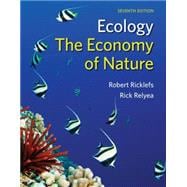
Note: Supplemental materials are not guaranteed with Rental or Used book purchases.
Purchase Benefits
What is included with this book?
RICK RELYEA is Professor of Biology at the University of Pittsburgh, where he has been on the faculty since 1999. In 2005, he was named the Chancellor’s Distinguished Researcher at the University of Pittsburgh. Professor Rick Relyea is a recipient of the University of Pittsburgh’s 2014 Tina and David Bellet Teaching Excellence. Since 2007, he has also served as the director of the University of Pittsburgh's field station, the Pymatuning Laboratory of Ecology, where he oversees a diverse set of ecological field courses and facilitates researchers from around the world. Rick has taught thousands of undergraduate students in introductory ecology, behavioral ecology, and evolution. His research is recognized throughout the world and has been published in the leading eco¬logical journals including Ecology, Ecology Letters, American Naturalist, and PNAS. The research spans a wide range of ecological and evolutionary topics including animal behavior, sexual selection, ecotoxicology, disease ecology, phenotypic plasticity, community ecology, ecosystem ecology, and landscape ecology. Rick's research focuses on aquatic habitats and the diversity of species that live in these ecosystems. He strives to integrate different areas of ecology in ways that provide new discoveries and applications
Chapter 1 Introduction: Ecology, Evolution, and the Scientific Method
PART I LIFE AND THE PHYSICAL ENVIRONMENT
Chapter 2 Adaptations to Aquatic Environments
Chapter 3 Adaptations to Terrestrial Environments
Chapter 4 Adaptations to Variable Environments
Chapter 5 Climates and Soils
Chapter 6 Terrestrial and Aquatic Biomes
Part II ORGANISMS
Chapter 7 Evolution and Adaptation
Chapter 8 Life Histories
Chapter 9 Reproductive Strategies
Chapter 10 Social Behaviors
PART III POPULATIONS
Chapter 11 Population Distributions
Chapter 12 Population Growth and Regulation
Chapter 13 Population Dynamics over Space and Time
PART IV SPECIES INTERACTIONS
Chapter 14 Predation and Herbivory
Chapter 15 Parasitism and Infectious Diseases
Chapter 16 Competition
Chapter 17 Mutualism
PART V COMMUNITIES AND ECOSYSTEMS
Chapter 18 Community Structure
Chapter 19 Community Succession
Chapter 20 Movement of Energy in Ecosystems
Chapter 21 Movement of Elements in Ecosystems
PART VI GLOBAL ECOLOGY
Chapter 22 Landscape Ecology, Biogeography, and Global Biodiversity
Chapter 23 Global Conservation of Biodiversity
The New copy of this book will include any supplemental materials advertised. Please check the title of the book to determine if it should include any access cards, study guides, lab manuals, CDs, etc.
The Used, Rental and eBook copies of this book are not guaranteed to include any supplemental materials. Typically, only the book itself is included. This is true even if the title states it includes any access cards, study guides, lab manuals, CDs, etc.